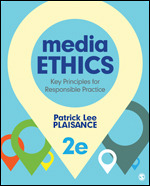Media Ethics
Key Principles for Responsible Practice
- Patrick Lee Plaisance - Penn State University, Colorado State University, USA, Syracuse University, Norfolk State University, Thomas Nelson Community College
"This book, more than any other media ethics textbook currently available, treats students as the intellectually curious, philosophically aware, and ethically motivated individuals that we hope them to be. As one brings one’s own wisdom to the reading with the understanding that there is more to learn, this is one of those rare books that has the potential to keep on giving to professors and to students."
Straightforward approach to ethical considerations
An accessible text that pitches the subject at an appropriate level for second years.
The book will be regularly used in classes and recommended to students.
Easy and accessible reading for students.

